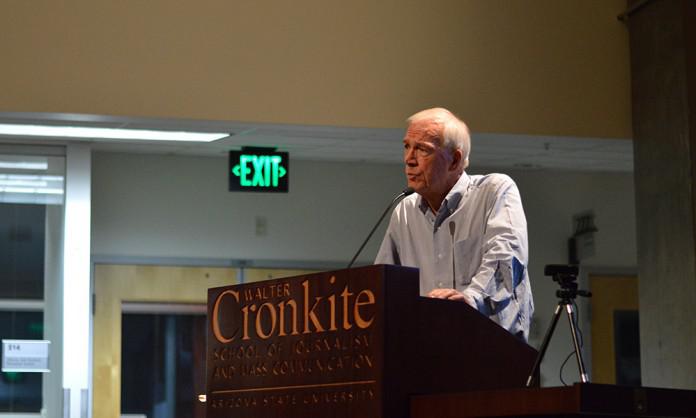|
‘Spotlight’ editor brings investigative expertise, fresh perspective to Cronkite
By Kelsey Hess
There is a long, deafening silence that follows the end of the Academy Award-winning film, Spotlight. That silence was the result of a stunned audience when I saw Spotlight at the AMC Theatre in the Arizona Center last November upon release. Nearly one year later at the Walter Cronkite School of Journalism and Mass Communication, the film brought out a similar reaction from ASU journalism students as a long list of cities represented that, yes, priests in your hometown – or a town just like it – have been caught molesting children. Spotlight, which won Best Picture at the Academy Awards last year in a triumphant win for journalism, followed the story of new Cronkite professor and The Boston Globe’s Walter Robinson and his investigative reporting team through their discovery of the cover-up of sexual abuse within the Roman Catholic Church. The article resulted in 300 calls from victims the day after the article was printed from as far as Australia. Nearly 600 follow-up articles were written by the Spotlight team in the year following. “We knew it was going to be a good story but we had no idea it would reverberate the way it did,” Robinson said to the crowd of students on Wednesday night. “It became apparent that this was a systematic problem. It’s not the crime as much as it is the cover-up; it became much clearer that everyone knew and had to have had facilitated this.” Robinson said their investigations revealed that the number of priests guilty of molestation in Massachusetts reached as high as 250, which is 10.7 percent of all priests in the state. Robinson, who was raised Catholic and was confirmed, baptized and married through the church, was devastated by the investigations just as much as his community. When a Cronkite student asked how he avoided his biases while treading in such upsetting issues, he gave refreshing and realistic reporting advice. “I try to maintain objectivity, but good journalists don’t need to be objective; you need to be fair,” he said. Traditions at The Boston Globe often resulted in editorial leadership being members of the staff who had been at The Globe for a long time, according to Robinson. Marty Baron came from Miami, and he was the first outsider, according to Robinson. “He came in with a fresh pair of eyes, which is a good reminder for any institution… Florida has the best public records law in the country, and he ended up seeing something that the rest of us didn’t see.” So when Spotlight hit theaters and Robinson found himself back on college campuses for the first time since teaching at Northeastern, “it reminded me of how much I missed interacting with students,” he said. Robinson, whose first spreadsheet for the Spotlight investigation took three and a half weeks to make, said he has learned as much from his students as they have learned from him with an unexpected sense of sincerity for someone so established. “We kind of grew together,” he said. As he prepares to move to Arizona and teach an investigative journalism class in the spring, he will be preparing for the transition from newsroom to classroom. “The main difference between the newsroom and the classroom is that there is boundless optimism about the future of journalism (in the classroom), and you don’t find too much of that in the newsroom now,” he said. “And some people would say, ‘students are naïve… they don’t understand the economic model and how it’s cratering,’ but people in the newsrooms see doom and gloom; Students see lots of opportunity to do journalism in new and exciting ways.” When Robinson taught an investigative journalism class at Northeastern, his reporting class produced 26 stories that ran in The Globe. He and Cronkite School Dean Christopher Callahan are in similar talks with The Arizona Republic for a similar arrangement. “In light with our model of professional partnerships…we were particularly interested because he succeeded in not just teaching investigative reporting, but also getting a lot of their projects published in The Globe,” said Callahan. Callahan first heard of Robinson when he was interning at The Globe in college and Robinson was doing political reporting as a State House Reporter. “I think he was looking for another teaching opportunity,” said Callahan. “With the reputation of The Cronkite School, he had a high degree of awareness for what we’re doing here.” Tim Eigo, Vice President of Arizona’s chapter of the Society for Professional Journalists, met Robinson for the first time tonight and was immediately impressed. “It is a phenomenal opportunity to have a journalist here who can speak to multiple generations of tools and strategies,” he said. “He was able to speak about the way they did things 20 or 30 years ago, but he was able to speak about the skills that it takes to be a good journalist – which has not changed at all.” The Society of Professional Journalists and the University of Oklahoma helped sponsor Wednesday’s screening, with U of O students contributing to the Q&A after the screening of the film. “Not everybody who is a journalist can be a professor, but I’m walking away feeling like I’d like to be in his class,” said Eigo. Contact: kelsey.hess@asu.edu
|
.
Any original material on these pages is copyright © BishopAccountability.org 2004. Reproduce freely with attribution.
